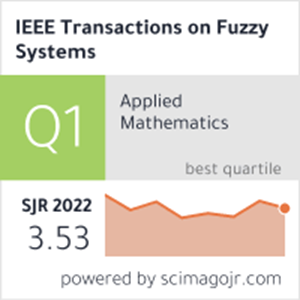Fuzzy Weighted Regularization for Fractional-Order Nonlinear Multiagent Systems Under Stackelberg–Nash Game
IF 11.9
1区 计算机科学
Q1 COMPUTER SCIENCE, ARTIFICIAL INTELLIGENCE
引用次数: 0
Abstract
This study focuses on achieving hierarchical optimal synchronization in a fractional-order nonlinear multiagent system (FONMAS) composed of a single leader and multiple followers, analyzed within the framework of the Stackelberg–Nash game theory. The leader makes decisions by anticipating the optimal responses of all followers, whereas each follower concurrently reacts optimally to the leader’s strategy by engaging in a Nash game. To obtain the optimal control policy of the FONMAS, a regularized fuzzy reinforcement learning approach is proposed. First, a fractional-order (FO) Hamilton–Jacobi–Bellman (HJB) equation in coupled form is formulated, which serves as the basis for deriving the optimal control policies of both the leader and the followers. It is further proven that these strategies constitute a Stackelberg–Nash equilibrium. Next, due to the asymmetry among agents, solving the FO coupled HJB equations becomes challenging. To address this, a hierarchical learning framework grounded in FO value iteration is proposed, which depends solely on partial knowledge of the system dynamics. We demonstrate that, given mild coupling assumptions, this method converges asymptotically to equilibrium policies. Furthermore, a regularized actor–critic framework with fuzzy logic is employed to estimate the cost function and optimal control policy, and the FO weight update rules are developed by formulating a Lyapunov function for the optimal fuzzy weight deviation, ensuring convergence to optimal weight values. Ultimately, both theoretical analysis and simulation results support the efficiency of the proposed method.Stackelberg-Nash对策下分数阶非线性多智能体系统的模糊加权正则化
在Stackelberg-Nash博弈论的框架下,研究了分数阶非线性多智能体系统(FONMAS)中由单个领导者和多个追随者组成的分层最优同步。领导者通过预测所有追随者的最优反应来做出决策,而每个追随者通过参与纳什博弈来同时对领导者的策略做出最优反应。为了获得最优控制策略,提出了一种正则化模糊强化学习方法。首先,建立了耦合形式的分数阶Hamilton-Jacobi-Bellman (HJB)方程,并以此为基础推导出领导者和追随者的最优控制策略。进一步证明了这些策略构成了Stackelberg-Nash均衡。其次,由于agent之间的不对称性,求解FO耦合HJB方程变得具有挑战性。为了解决这个问题,提出了基于FO值迭代的分层学习框架,该框架仅依赖于系统动力学的部分知识。我们证明,在温和耦合假设下,该方法渐近收敛于均衡策略。在此基础上,基于模糊逻辑的正则化行为者-批评家框架对代价函数和最优控制策略进行估计,并通过构造最优模糊权值偏差的Lyapunov函数,建立了最优权值更新规则,保证了最优权值的收敛性。理论分析和仿真结果均证明了该方法的有效性。
本文章由计算机程序翻译,如有差异,请以英文原文为准。
求助全文
约1分钟内获得全文
求助全文
来源期刊

IEEE Transactions on Fuzzy Systems
工程技术-工程:电子与电气
CiteScore
20.50
自引率
13.40%
发文量
517
审稿时长
3.0 months
期刊介绍:
The IEEE Transactions on Fuzzy Systems is a scholarly journal that focuses on the theory, design, and application of fuzzy systems. It aims to publish high-quality technical papers that contribute significant technical knowledge and exploratory developments in the field of fuzzy systems. The journal particularly emphasizes engineering systems and scientific applications. In addition to research articles, the Transactions also includes a letters section featuring current information, comments, and rebuttals related to published papers.
 求助内容:
求助内容: 应助结果提醒方式:
应助结果提醒方式:


